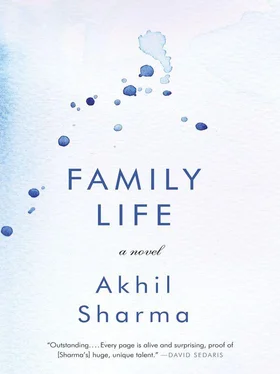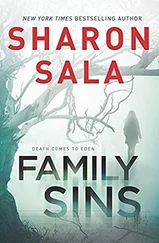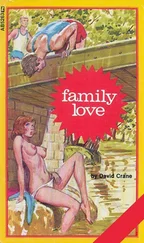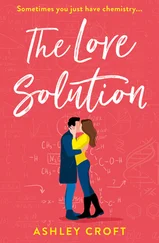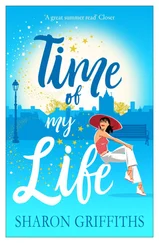Some of the wives and husbands spoke. They were quieter and more thoughtful than the alcoholics. A white woman said, “I know that I have to look after myself and my children, but what do I do? I don’t want him to die.” The man she was sitting next to, young, black, and gaunt, was leaning forward in his chair and looking down. He had a rubber band on one wrist that he kept snapping.
MY FATHER WAS released.
On the train home, my mother and I sat facing him. It was late afternoon. He was bundled in his winter coat with his gray cap pulled over his ears. He looked small and nervous. I felt anxious. At the hospital we had known he wouldn’t drink. Now, I imagined that back home, he would not drink for a little while but then start again. Looking at my father’s face, I had a sudden fantasy of being in Bombay, in an apartment overlooking the sea. I had only seen Bombay in the movies, and I think the fantasy came from wanting a different life.
We arrived at Metropark Station. My mother drove us home.
In the car, my father sat up front and peered out the window. The sun was bright, and we drove past houses standing behind lawns in winter light. The houses didn’t look real. They resembled a set on a stage.
We entered our house through the laundry room. My father said, “I don’t want to see him today. Is that all right?”
“Of course. Go upstairs. Rest.”
My father left. My mother and I went to Birju’s room. He was snoring, and the aide was seated beside him knitting a sweater. My mother kissed Birju and spoke to him in a childish voice.
That evening, my father got ready to go to an Alcoholics Anonymous meeting, and so did I. My mother wanted me to accompany him so that he would not go somewhere and start drinking.
The church was around the corner from us, a white, steepled building with a parking lot and a small graveyard. Inside were fifty or sixty men and women standing around talking. Some of them were smoking. There were a half dozen women with infants and toddlers. There were also a few children who were ten or eleven, whose parents, I imagined, had been unable to get babysitters. All of the people were white. They appeared strangely ordinary to me, not like people with problems.
The meeting began. People sat down in rows of chairs. There was a table near the front of the room. A man sitting at the table asked if anyone was at an AA meeting for the first time. My father raised his hand. We were in the room’s back and there was a stir of excitement. People turned to look at us. I remembered the boys at school who made fun of what I brought for lunch. I hated these people who were staring. I felt that they had no manners.
A very heavy woman was also sitting at the front table. She was blond and missing teeth, and she had a two-liter bottle of Coca-Cola on the table before her. She was the first to speak. She told her story. She said that she had started drinking when she was in fifth grade. “I would come home and have a shot of whiskey and one of my mother’s Marlboros, and that’s how I took the edge off.” She laughed huskily. Phlegm popped in her lungs.
My father sat leaning forward, focused.
The woman talked about dropping out of school, getting married, having abortions. When she mentioned abortions, a part of me flinched. I was surprised that she would say something like this out loud.
The woman talked about her husband beating her, about how one night, he sat at the kitchen table of their house with a revolver and waited for the police to enter so he could start shooting. “I knew that was bad.” The crowd laughed. I thought, Why are you laughing at this misery? You have created trouble for everyone and now you are laughing. “I went out the back door to tell the police my husband had a gun and was waiting inside.” Then she spoke of waking up passed out in front of her son, and this, for some reason, changed things. “My life in sobriety hasn’t been good. I am morbidly obese. I don’t have any money. My son would like a guitar for his fourteenth birthday, and I can’t buy him one. Maybe I’ll ask his grandmother. She’s willing to give me money now.”
After this, many other people spoke. Most talked for a shorter time than the woman with the Coke. Another woman said she had recently begun drinking mouthwash. “My son is getting married, and I’m a fat pig.” A man spoke about being separated from his wife and when he wanted to send his son a birthday card, he had to write the card in front of his probation officer because he wasn’t allowed to have any contact with his children. I couldn’t understand what most of this had to do with drinking.
I also got angrier and angrier at the thought that white people behaved in such ways and yet they were the ones who were important.
The meeting started at seven and ended at eight. When it finished, people stood around the room and held hands and said the Lord’s Prayer. My father and I joined in the hand-holding and tried repeating the words as they were spoken. Saying them, I felt that we were trying to pass as whites.
Immediately after this, we were surrounded by men who began giving my father scraps of paper with their phone numbers. I wondered what these people wanted from us. At the hospital, a nurse had brought us tubes of hand lotion and bottles of talcum powder and tried to get us to convert to Christianity. She had said that if we believed in Jesus Christ, Birju would get better in a minute. When she realized we were not going to convert, she took the hand lotion and talcum powder away.
Outside the church, I became giddy with relief. The wind was wet and cold. Walking across the parking lot, I laughed. “My God, I didn’t know white people had such problems.”
“Who are these people?” I said. “Who does things like that? Where are they from? Do they live in Edison? When they were talking, I kept thinking, Why do you have problems? You’re white. Even more terrible things should happen to you. You should suffer like Indians, like black people. That’ll teach you.” I said all this because I felt it. I also said it because I wanted my father to say he was nothing like the people in the meeting.
IN THE DAYS that followed, my father and I went to AA meetings every night. The meetings occurred in small rooms in churches and in big ones. Some took place in a very large, glass-walled party space that was next to a fire department. During the AA meeting, people drew curtains over these walls.
At first my father was regularly surrounded by men giving him their phone numbers. Some also gave him books and mimeographed sheets with lists of where the AA meetings took place. Surrounded by these people, I would feel scared, feel that we would have to say yes we wanted help, when in reality we wanted to be left alone.
I began to recognize some of the people from the meetings. Many of them appeared not just alcoholic but also crazy. There was a man who talked regularly about a religious radio station that he listened to. Another man, who carried a cane, would interrupt people as they spoke and offer his opinions. There was a very skinny woman who would say that she knew that the people in the meeting did not like her and then start crying.
Often as I sat in these meetings I was disgusted. Even the people who said sensible things, the men and women who shouted down the man who began passing out anti-abortion pamphlets, irritated me. They had created problems for themselves and their families with their drinking and now had to come up with such an elaborate solution that their families also had to be involved.
MY FATHER, WHEN he got out of Bellevue, was nervous, timid. He would not look people in the eye.
In many ways, I don’t think my mother and I realized how scared he was. A few weeks after he came home, he began telling people that we knew, people he saw on the train going to work, that he was an alcoholic, that he had been in a hospital because he couldn’t stop drinking. Later, he told me and my mother that he did this because he hoped these people would somehow keep him from drinking.
Читать дальше
